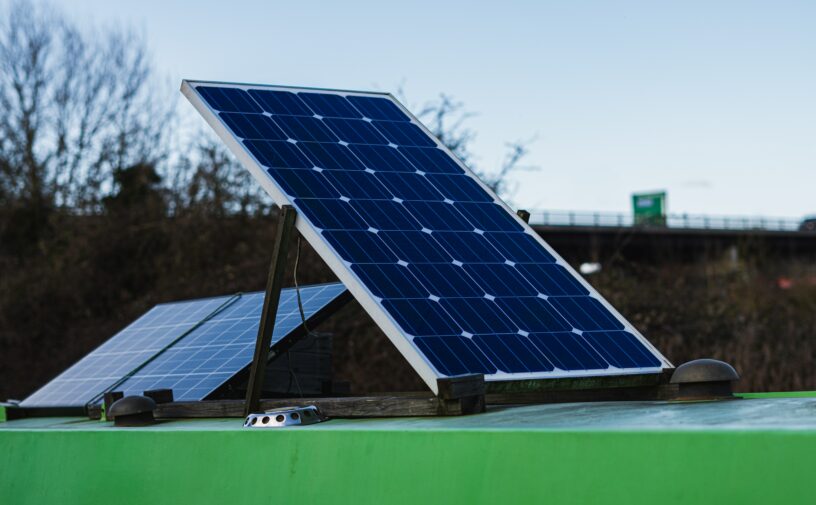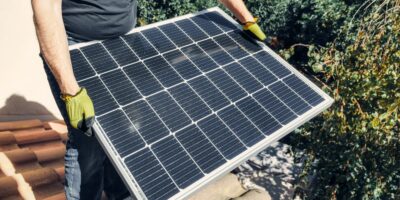Introduction to Off-Grid Solar Energy
As a clean energy blogger passionate about solar energy, I understand the importance of educating homeowners about the various options available for solar power systems. Off-grid solar energy is an exciting and increasingly popular choice for those seeking independence from the electrical grid, self-sufficiency, and a greener lifestyle. This comprehensive article will delve into the world of off-grid solar energy, providing detailed information and insights to help you determine if it’s the right choice for your home.
What Are On-Grid, Off-Grid, and Hybrid Solar Systems?
Before we dive into off-grid solar energy, it’s essential to understand the three main types of solar power systems:
- On-Grid (Grid-Tied) Solar Systems: These systems are connected to the local utility grid and rely on it for backup power when the solar panels aren’t producing enough electricity. Excess power generated by the solar system can be fed back into the grid, earning the homeowner credits through net metering programs.
- Off-Grid Solar Systems: As the name suggests, these systems are entirely independent of the utility grid. They rely solely on solar panels and energy storage solutions, such as batteries, to provide electricity for the home. Off-grid systems are ideal for remote locations or those seeking complete energy independence.
- Hybrid Solar Systems: These systems combine the best of both worlds, utilizing grid connection and energy storage solutions. This allows homeowners to store excess solar energy for later use while still having access to grid-supplied power when needed.
Differences Between On-Grid, Off-Grid, and Hybrid Solar Systems
Here are the key differences between on-grid, off-grid, and hybrid solar systems:
- Connection to the Utility Grid: On-grid systems are connected to the utility grid, while off-grid systems are independent. Hybrid systems are connected to the grid but incorporate energy storage solutions for greater self-sufficiency.
- Energy Storage: Off-grid and hybrid systems require energy storage solutions, such as batteries, to store excess solar power for use when solar production is low. On-grid systems typically do not include energy storage, as they rely on the grid for backup power.
- Cost and Complexity: Off-grid systems tend to be more expensive and complex than on-grid systems due to the need for energy storage and additional components. Hybrid systems can also be more costly and complicated than on-grid systems, depending on the extent of energy storage incorporated.
Advantages of Off-Grid Solar Energy for Homeowners
There are several compelling reasons for homeowners to consider off-grid solar energy:
- Energy Independence: With an off-grid solar system, you no longer rely on the utility grid for electricity, providing complete control over your home’s energy supply.
- No Electricity Bills: Since you are generating and storing your electricity, there are no monthly electricity bills to worry about.
- Environmental Benefits: Off-grid solar systems produce clean, renewable energy, reducing your carbon footprint and contributing to global efforts to combat climate change.
- Remote Living Possibilities: Off-grid solar systems enable homeowners to live in remote locations where connecting to the utility grid may be difficult or prohibitively expensive.
Disadvantages of Off-Grid Solar Energy for Homeowners
Despite its many benefits, off-grid solar energy also has some drawbacks:
- Higher Initial Costs: Off-grid solar systems typically have higher initial costs due to the need for energy storage and additional components. However, these costs can be offset over time by savings on electricity bills.
- Limited Energy Supply: Off-grid systems rely solely on solar power and energy storage, which can be limited during periods of low sunlight or high energy demand. Homeowners may need to carefully manage their energy consumption to avoid running out of power.
- Maintenance and Monitoring: Off-grid systems may require more maintenance and monitoring than on-grid systems, particularly regarding battery management and system performance.
Considerations Before Implementing an Off-Grid Solar Energy System
Before investing in an off-grid solar energy system, homeowners should consider several factors that can impact the feasibility, cost-effectiveness and overall benefits of going off-grid:
- Local Climate and Sunlight: The amount of sunlight your home receives and the local climate conditions will directly affect the performance and efficiency of your off-grid solar system. More sunlight typically means more energy production and less reliance on energy storage.
- Energy Consumption Patterns: Understanding your household’s energy consumption patterns is crucial for designing an off-grid solar system that meets your needs. This includes considering factors such as daily and seasonal energy usage and any energy-intensive appliances or devices.
- System Sizing and Design: Properly sizing and designing your off-grid solar system is essential to ensure adequate energy production and storage. Working with an experienced solar professional can help you determine the appropriate system size and design based on your home’s location, energy consumption patterns, and other factors.
Design and Adaptation Considerations for Off-Grid Solar Energy Systems (Expanded)
When designing and adapting your home for an off-grid solar energy system, consider the following:
- Solar Panel Placement: The placement of your solar panels will directly impact their energy production. Work with a solar professional to determine your solar panels’ best location, orientation, and tilt angle to maximize their efficiency. Additionally, consider factors such as shading from nearby structures or trees, which can significantly reduce the energy output of your solar panels.
- Energy Storage Solutions: Selecting the right energy storage solution, such as batteries, is crucial for maintaining a reliable and efficient off-grid solar system. Consider factors such as battery capacity, efficiency, lifespan, and cost when choosing an energy storage solution. Research the different types of batteries available on the market, including lead-acid, lithium-ion, and flow batteries, to determine which option best suits your needs and budget.
- Backup Power Options: While off-grid solar systems are designed to provide complete energy independence, it’s essential to consider backup power options for emergencies or periods of high energy demand. This may include a backup generator or a connection to the utility grid (if available). Additionally, consider incorporating energy-efficient appliances and devices into your home to reduce overall energy consumption and minimize the need for backup power.
- System Integration: An off-grid solar system must integrate seamlessly with your home’s electrical infrastructure. This may require upgrading your electrical panel, wiring, and other components to accommodate the new solar system. Consult a solar professional to determine the necessary upgrades and modifications to ensure proper system integration.
- Energy Management: Implementing energy management strategies can help you optimize the performance of your off-grid solar system and make the most of the solar energy you produce. This may include using smart thermostats, energy-efficient lighting, and home automation systems to monitor and control your energy consumption. Additionally, consider adopting energy conservation habits, such as using appliances during periods of high solar production and minimizing energy use during periods of low sunlight.
Financing Options and Incentives for Off-Grid Solar Energy Systems (Expanded)
While off-grid solar energy systems can be more expensive than their on-grid counterparts, there are several financing options and incentives available for homeowners looking to invest in off-grid solar energy systems:
- Loans: Homeowners can obtain loans from banks or other financial institutions to finance the purchase and installation of an off-grid solar system. These loans typically require a down payment and have interest rates that vary based on the borrower’s creditworthiness. Some lenders specialize in renewable energy financing and may offer more favorable terms and rates for solar energy projects.
- Tax Credits and Incentives: Governments often offer tax credits and incentives to encourage homeowners to invest in solar energy. In the United States, the federal Investment Tax Credit (ITC) allows homeowners to claim a tax credit worth 26% of the cost of their solar system in 2021, decreasing to 22% in 2023. Many states and local governments offer additional incentives, such as property tax exemptions, rebates, and low-interest financing options. Research the specific incentives available in your region to maximize the financial benefits of your off-grid solar project.
- Leasing and Power Purchase Agreements (PPAs): While less common for off-grid solar systems, some solar companies offer leasing and power purchase agreement options for homeowners who want to avoid the upfront costs of purchasing a solar system outright. With a solar lease, you pay a fixed monthly fee to use the solar system, while with a PPA, you pay for the electricity the system generates at a predetermined rate. Both options allow you to enjoy the benefits of solar energy without the upfront investment but may limit your long-term cost savings.
- Crowdfunding and Community-Based Financing: Some homeowners have successfully funded their off-grid solar projects through crowdfunding platforms or community-based financing initiatives. By sharing your project with friends, family, and the broader community, you can raise funds to help offset the costs of your off-grid solar system while also raising awareness of renewable energy and its benefits.
- Energy Savings Performance Contracts (ESPCs): ESPCs are a financing option for larger-scale off-grid solar projects, typically for commercial or institutional buildings, where a third party finances the project and shares in the cost savings generated by the solar system. While not commonly used for residential off-grid solar systems, ESPCs may be an option for homeowners with larger properties or those looking to develop a community-based off-grid solar project.
By exploring these various financing options and incentives, homeowners can make off-grid solar energy more accessible and affordable, allowing them to enjoy the many benefits of clean, renewable power.
Maintenance and Monitoring of Off-Grid Solar Energy Systems
Regular maintenance and monitoring of your off-grid solar energy system are crucial to ensure its optimal performance and longevity. Here are some tips for keeping your off-grid solar system in top condition:
- Monitoring System Performance: Regularly monitor your off-grid solar system’s performance using built-in monitoring software or third-party solutions. This can help you identify any issues or inefficiencies that need to be addressed, such as underperforming solar panels, battery degradation, or other component failures. Monitoring your system’s performance can also help you better understand your energy consumption patterns, allowing you to adjust to optimize your solar production and overall energy usage.
- Routine Inspections and Cleaning: Conduct routine inspections of your solar panels, energy storage solutions, and other system components to check for signs of wear or damage. Clean your solar panels as needed using a soft brush and water to maintain their efficiency. Keep an eye out for any signs of corrosion, loose connections, or damaged wiring that may require professional attention.
- Battery Maintenance: Proper battery maintenance is essential for your off-grid solar system’s long-term performance and reliability. This includes regularly checking the battery’s electrolyte levels (for flooded lead-acid batteries), ensuring that the terminals and connections are clean and secure, and monitoring the battery’s state of charge and overall health. Consult your battery manufacturer’s guidelines for specific maintenance recommendations.
- Inverter and Charge Controller Maintenance: The inverter and charge controller are critical components of your off-grid solar system, responsible for converting the solar-generated DC power into usable AC power and managing the flow of electricity between the solar panels, batteries, and your home. Periodically inspect these components for signs of wear or damage, and consult the manufacturer’s guidelines for any recommended maintenance procedures.
- System Upgrades and Improvements: As technology advances and new innovations emerge in the solar industry, consider upgrading or improving your off-grid solar system to enhance its performance and efficiency. This may include upgrading to more efficient solar panels, incorporating newer battery technologies, or updating your system’s monitoring and control capabilities.
- Professional Maintenance and Repairs: If you encounter any issues with your off-grid solar system or notice a significant drop in performance, contact a certified solar professional to diagnose the issue and perform any necessary repairs or maintenance. Regularly scheduled professional maintenance can help extend the life of your solar system and ensure that it continues to provide reliable, clean energy for your home.
By following these maintenance and monitoring tips, you can keep your off-grid solar energy system running smoothly and efficiently, maximizing its performance and lifespan. Proper care and attention will help you enjoy the benefits of clean, renewable power, protect your investment, and contribute to a more sustainable and self-sufficient future.
Conclusion: Is Off-Grid Solar Energy Right for You?
Deciding whether off-grid solar energy is the right choice for your home depends on several factors, including your energy consumption patterns, local climate conditions, and personal preferences for energy independence and environmental impact. By carefully considering the benefits, drawbacks, and other factors discussed in this article, you can decide whether off-grid solar energy is suitable for your home.
Off-grid solar energy offers unique advantages, such as energy independence, reduced electricity bills, and the ability to live in remote locations. However, it also comes with challenges, such as higher initial costs, limited energy supply, and increased maintenance requirements. By working with experienced solar professionals and taking the time to understand the nuances of off-grid solar systems, homeowners can enjoy the many benefits of clean, renewable power while positively impacting the environment and their local community.
When evaluating if off-grid solar energy is right for you, consider the following questions:
- Do you value energy independence and self-sufficiency? If you desire complete control over your home’s energy supply and want to be independent of the utility grid, off-grid solar energy may be attractive.
- Are you prepared for the higher initial costs and ongoing maintenance associated with off-grid solar systems? While the long-term savings on electricity bills can offset these costs, it’s essential to be financially prepared for an off-grid solar system’s upfront investment and maintenance requirements.
- Is your home located in an area with sufficient sunlight and favorable climate conditions for solar energy production? The efficiency and reliability of your off-grid solar system will depend on the sunlight your home receives and the local climate conditions.
- Are you willing to adapt your energy consumption habits and implement energy management strategies to optimize your off-grid solar system’s performance? Successfully living off-grid may require adjustments to your energy consumption habits, such as using appliances during periods of high solar production and minimizing energy use during periods of low sunlight.
In conclusion, off-grid solar energy can be attractive and rewarding for homeowners seeking energy independence, cost savings, and a greener lifestyle. By carefully considering the information in this comprehensive guide, working with knowledgeable solar professionals, and asking yourself the critical questions outlined above, you can determine if off-grid solar energy is the best fit for your home and embark on a more sustainable and self-sufficient future.



